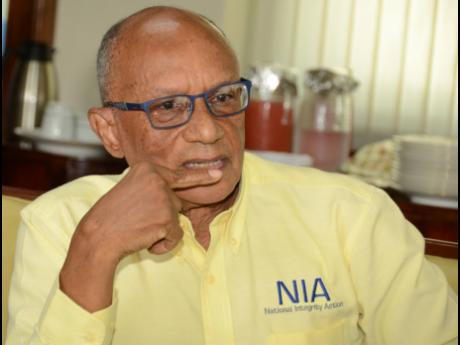MP role taints contract award process – Munroe
Professor Emeritus Trevor Munroe has said that serious and urgent consideration must be given to the Integrity Commission’s recommendation that parliamentarians refrain from making recommendations for the award of contracts to employees, political...
Professor Emeritus Trevor Munroe has said that serious and urgent consideration must be given to the Integrity Commission’s recommendation that parliamentarians refrain from making recommendations for the award of contracts to employees, political party affiliates, business associates, and personal friends.
The National Integrity Action director said that where this practice remains unchecked, the stain of corruption, favoritism, and cronyism – whether real or perceived – will taint the integrity of public contracts, projects, or programmes that would otherwise be legitimate.
Munroe was speaking with The Gleaner on Wednesday after it was revealed that the Integrity Commission has referred a report implicating Prime Minister Andrew Holness in an alleged conflict of interest to its director of corruption prosecution. The commission concluded that he may have influenced the awarding of millions of dollars in government contracts to the company of a business associate through the Ministry of Education, Youth and Information when Holness served as portfolio minister, the Social Development Commission (SDC), and the National Works Agency (NWA).
In a statement yesterday, Holness said he “strongly disagree[d] with the findings of the Integrity Commission regarding conflict of interest based on mere association”, adding that he had never “exercised influence on any process for the award of contracts”.
Munroe also took the NWA and the SDC to task, noting that the failure of both entities to file required reports confirms a tendency in a majority of public bodies to breach rules designed to uphold accountability in the public sector.
The anti-corruption campaigner also highlighted flagrant breaches of the Public Bodies Management and Accountability Act by ministries, departments, and agencies.
Munroe said that at present, more than 120 of 160 public bodies, including the NWA and the SDC, are breaking the law in this regard.
“The white-collar persons responsible for this continued lawless conduct, for spending tens of billions of public money annually with absolutely no accountability to the public, must henceforth be brought before the courts and punished when found guilty,” he charged.
And the NIA director said that the commission’s report reconfirms the importance of safeguarding and strengthening the free press as a critical component of the country’s democratic governance.
“Without the investigative work of ‘18 degrees North’ aired by TVJ in May 2016, the public would have been in the dark on matters raised in the director of investigations’ report,” he said.
“The fact that the [Integrity Commission] could have conducted this investigation and concluded with a recommendation that the PM be referred to the director of corruption prosecution in respect to breaches of anti-corruption law indicates an appropriate level of independence of Jamaica’s Integrity Commission,” added Munroe.
He argued that this referral should be complemented by vigorous, comprehensive, and prompt determination of whether such breaches occurred or not.
“This is the more necessary in the context of high levels of distrust of politicians and continuing cynicism – ‘nuttin naw come out a it’ – co-existing with the growing tendency amongst our people to report wrongs to our anti-corruption bodies,” he told The Gleaner.

